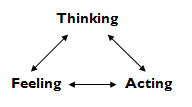A type of therapy called Positive Psychology, has been gaining popularity as research continues to demonstrate the effectiveness of positive psychology in helping people feel better and increase their well-being. Compared to many other approaches to therapy, positive psychology focuses less on identifying and fixing deficits, and more on recognizing and building on positives—looking at “What’s right with you?” instead of “What’s wrong with you?”
In his book Flourish: A Visionary New Understanding of Happiness and Well-Being, Martin Seligman writes:
We think too much about what goes wrong and not enough about what goes right in our lives. Of course, sometimes it makes sense to analyze bad events so that we can learn from them and avoid them in the future. However, people tend to spend more time thinking about what is bad in life than is helpful. Worse, this focus on negative events sets us up for anxiety and depression. One way to keep this from happening is to get better at thinking about and savoring what went well.
Seligman, who is one of the founders of positive psychology, has developed an exercise called “Three Good Things,” or “Three Blessings,” to help you recognize and appreciate the positives things in your life.
In the two videos below, Seligman talks about this exercise. There are written instructions following the videos.
The instructions are quite simple.
Summary
- Each night, set aside 10 minutes after dinner and before you go to bed
- Write down three good things that happened today
- Next to each positive event answer the question, Why did this happen?
Longer Version:
1. Each night, set aside 10 minutes after dinner and before you go to bed.
2. Think about anything good that happened to you today.
3. Write down these three positive things.
4. Reflect on why each good thing happened.
Or you might say that your child took its first step today because God was pouring blessings down upon your family, or because it really wanted to get to some cookies on the table. You get to decide reasons for each event that make sense to you.
Once you start looking for positive things that happen in your life, you can usually find at least three small things that went well every day, and start enjoying some benefits of positive psychology. Researchers have found that doing this simple exercise for just one week increases happiness and decreases symptoms of depression for up to six months, and that many people find the exercise so helpful they continue with it after the one-week period is up. For a similar exercise, read about the gratitude journal.





